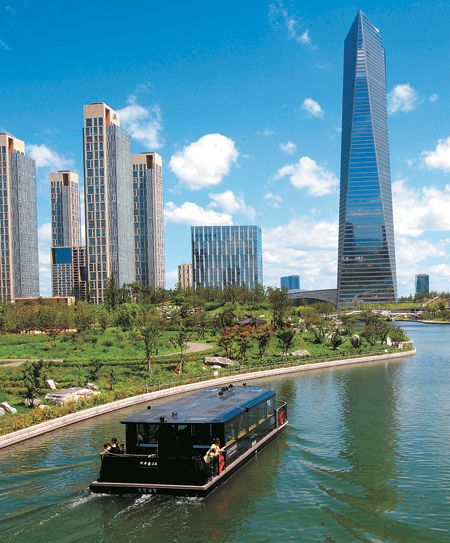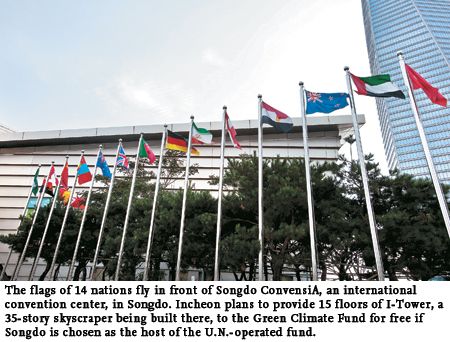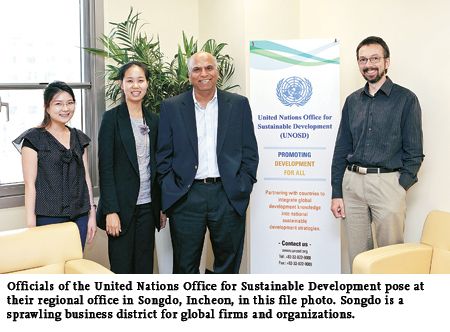Songdo leads fight against climate change

Songdo Central Park commands an excellent view of the international business district in Songdo, Incheon. / Courtesy of Incheon Metropolitan City
Incheon City plans to provide 15 floors of I-Tower, a 35-story skyscraper being built inside the Songdo International Business District, for free to the Green Climate Fund (GCF), if it is chosen as the host of the U.N.-operated fund.
The building, which houses regional offices of some 10 international organizations, including the United Nations Economic and Social Commission for Asia and the Pacific, is scheduled to be completed in February next year.
The city has also pledged to provide $7 million to the GCF to help it cover operating costs and create a $40-million trust fund to finance efforts by developing and under-developed countries to fight climate change.
“We are ready to provide all possible assistance to the GCF,” Incheon Mayor Song Young-gil said. “I believe Songdo is the best location for the GCF because it represents Korea’s efforts to reduce greenhouse gas emissions. You can see Korea’s future in Songdo.”
The fund’s 24-board member, equally split between developed and developing countries, will gather in Songdo, Thursday to pick the host of the GCF, envisioned to finance global efforts to cope with climate change. Songdo is competing with Bonn and Geneva, among others, to host the global fund.
Their selection will be endorsed at the United Nations Framework Convention on Climate Change (UNFCCC) conference, which will take place in Doha, Qatar, from Nov. 26 to Dec. 7.
The GCF will play a central role in supporting projects, programs, policies and other activities in developing countries to fight global warming. Hosting the fund has a significant meaning for Korea, which has become a unique example for developing and underdeveloped nations in preparing for the era of “green growth,” Song said.
“After rising from the ashes of the Korean War (1950-53), Korea showed its unstoppable determination for growth and development that culminated in the Miracle on the Han River,” the mayor said. “Based on the experience, it is now creating a new success story on fighting climate change and energy depletion.”
Songdo represents Korea’s vision of green growth and globalization. Its concept is a smart and green city, designed to provide the best environment for businesspeople from around the world as well as comfortable living conditions for them and their families.
Bridging role
Korea has made remarkable strides since declaring green growth as a national vision.
The country moved quickly under a comprehensive national plan to transform the nation into an economy powered by top-notch green technologies.
The development of green technologies and the establishment of a green infrastructure across a wide range of industries are creating a virtuous cycle in which both environmental protection and economic growth are pursued together.
Officials here hope the country’s new vision will achieve harmony between the economy and the environment while tackling climate change and environmental challenges by enhancing resource efficiency and securing innovative new growth engines.
“It’s time to support emerging and developing countries in their efforts to create and implement national and local-level strategies, policies and institutional mechanisms for green growth,” said Cho Myung-woo, Incheon’s vice mayor for administrative affairs.
“The top priority should be on reducing poverty, creating job opportunities as well as achieving social development that are environmentally sustainable and secure.”
Cho said Korea should host the GCF because it has played a bridging role between developed and developing countries in narrowing differences in mapping out such roadmap.
In 2010, Korea opened the Global Green Growth Institute in Seoul to drive global green growth. By leading the international campaign for green growth, the country looks to bridge developed and developing countries in coping with climate change.
“Korea has increased its role in fighting climate change in line with the global paradigm shift toward ‘green economies’ with its own multi-billion-dollar project to develop clean energy sources and eco-friendly technologies,” Cho said.
“On the global stage, it is playing a bridging role between developed and developing economies in preparing for the emerging economic trend. That makes Songdo the perfect location for the GCF, which will tackle challenges for both developed and developing countries,” he said.
Incheon expects green finance to be a core enabler of sustainability in the era of green growth. If companies want to be committed to sustainability or green growth, they should have the necessary expertise, practical tools and financial solution to achieve the strategies.
The transition to low-carbon growth will also bring many opportunities for businesses. An increasing number of companies are expected to place “sustainable finance” at the core of their business strategies by managing sustainability risks while seeking new opportunities. In taking this path, they will seek opportunities to advance into the low carbon, energy financing markets, officials said.
“Economy-wide initiatives have been introduced to transform the country’s system of securing resources, its practice of utilizing energy and power generation. Green initiatives are also at work in industries, agriculture, forestry, land use, buildings and transportation,” the vice mayor said.
“By hosting the GCF, Incheon will pursue a smooth transition to a greener and more energy-efficient economy making use of a greater share of renewable and clean energy with a lesser dependence on fossil fuels,” he added.
He said both developed and emerging economies should work under a shared goal to address global warming.
Smart, green city
Korea has already agreed with many African and Southeast Asian countries to promote exchanges of green growth technologies. They have agreed on the transfer of such technologies and launching joint eco-tourism and biomass energy projects in a bid to help resolve global environmental issues and contribute to the creation of green markets.
“Incheon wants to take fundamental measures with the rest of the world to prepare for a paradigm shift in the global economy,” Mayor Song said. “We are ready to participate in global efforts to fight climate change and play a bridging role between advanced and emerging countries in preparing for the new trend.”
I-Tower, where the GCF office would be housed, is an eco-friendly building tailored for international organizations.
Incheon has set a voluntary target to reduce carbon emissions to 38 percent below projected levels by 2020. Under the initiative, the city plans to set up guidelines for construction and public transportation firms to drastically cut carbon emissions; provide administrative and financial support for firms to help develop renewable energy sources to decrease energy dependence on oil and enhance disaster control systems.
It has built a sewage recycling system and one of the largest pneumatic waste collection systems in the world to achieve the goals of reusing 40 percent of waste water and 76 percent of other wastes. <The Korea Times/Na Jeong-ju>



























































